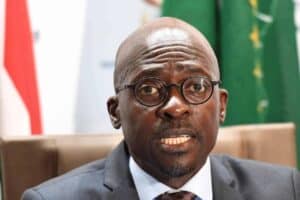‘You can’t escape the long arm of the US Department of Justice.'

On Thursday morning the Financial Times reported that the FBI had “opened an investigation into US links to South Africa’s Gupta family”. The paper noted that the “US probe has focused, in part, on Ashish and Amol Gupta, who are nephews of the South African-based brothers and are US citizens”.
While these two Gupta nephews may provide the link, partner at Herbert Smith Freehills, Peter Leon, believes the investigation is unlikely to begin and end with them.
“The important issue from a US perspective is whether any of the Guptas or their companies were involved in money laundering, which is treated as racketeering in the US,” he says. “As I understand US law, if any wire transfers are made using the US banking system, the US Department of Justice will have jurisdiction on all those involved.”
This means that the Gupta brothers who currently resident in South Africa are not immune from prosecution in the US.
“If they themselves are involved, they could fall within the scope of the investigation,” he says. “You can’t escape the long arm of the US Department of Justice. It is too strong, too efficient and too ferocious.”
The news of the FBI investigation was welcomed by Corruption Watch, which has been arguing for some time that international authorities should get involved in investigating the allegations around state capture. The organisation’s executive director, David Lewis, points out that there are definite indications in the Gupta emails that foreign entities may have been used to launder money.
“Corruption in this country has manifestly involved foreign bank accounts and companies registered elsewhere,” says Lewis. “It was just a matter of time before these enforcement agencies, which have laws that don’t allow their banks, currencies, or companies registered in their countries to be used for this purpose, started looking into it.
“Even though all of the originating acts of corruption may be have been perpetrated in South Africa, if there was a US-registered company involved, if there was a company with a listing in New York involved, if US currency was used to remit funds that were illegally acquired, then they are within US jurisdiction, regardless of who they are and whose citizens they are,” Lewis explains.
Failure of local agencies
While the FBI’s investigation has been positively received by those wanting to see the state capture allegations thoroughly investigated, it also serves as something of an indictment on South Africa’s own law enforcement agencies.
“It means that the National Prosecuting Authority (NPA) is discredited in this process so far, frankly,” says Leon. “Unfortunately the NPA, which should be independent, impartial and prosecute without fear or favour does none of those things, because it appears in thrall to the current administration. Unfortunately this has a long tail. It can’t be entirely blamed on the Zuma administration, because the Mbeki and Motlanthe administrations got rid of the former head of the NPA, Vusi Pikoli as a result of the prosecution of Jackie Selebi. So the problem in fact started earlier on.
“But the good thing is that countries such as the US and the UK have very effective anti-corruption mechanisms if there is any jurisdictional link to them,” Leon adds.
Lewis agrees that the NPA has failed to live up to its responsibilities.
“The really distressing thing is that you would have expected an enquiry like this to originate in our own country and then to draw in foreign law enforcement agencies, whose own laws have been broken, to support us in enforcing our own laws,” Lewis says. “But they are not investigating in our country and that is a real problem.”
According to Leon, the critical issue is that the head of the NPA is currently appointed by the president. Unfortunately this allows for political interference.
He compares the situation in South Africa to that of Brazil, where two former presidents and the current president are being investigated for corruption by a truly independent prosecuting authority.
“Since the return of democracy to Brazil at end of the 1980s, the federal prosecuting authority has been completely protected from political interference,” says Leon. “Unfortunately that is not the case here. So what you have in South Africa is a dependable head of the NPA who does not act independently. While we have an independent judiciary, if the NPA is not independent that creates a serious problem for the rule of law.”
This is why Corruption Watch has been actively trying to involve international law enforcement.
“We try to get international authorities involved because we recognise that our NPA and Hawks are unlikely to do this themselves,” says Lewis. “Unfortunately the state of those agencies is the most serious impediment the country faces in dealing with grand corruption.”
Brought to you Moneyweb
Support Local Journalism
Add The Citizen as a Preferred Source on Google and follow us on Google News to see more of our trusted reporting in Google News and Top Stories.






